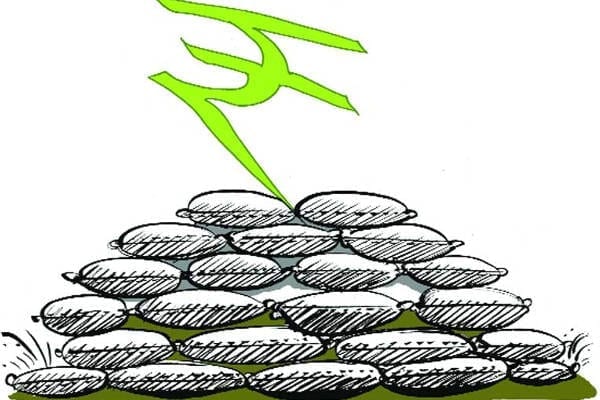While this subsidy for 2018-19 is estimated to be Rs 70,080 crore — a part of this is to pay up the arrears — the estimate had factored in likely savings to the tune of Rs 20,000 crore from in-kind DBT
By Prasanta Sahu and Prabhudatta Mishra
After putting a lid on the runaway petroleum subsidy by decontrolling petrol and diesel prices and limiting LPG subsidy to the really needy, the Centre has quietly put in place a mechanism to curb its fertilizer subsidy outgo. So far, fertilizer outlets in 31 states/UTs in the country have installed electronic point of sale (ePoS) devices linked to Aadhaar. And, according to preliminary estimates, the subsidy outgo on these farm inputs has reduced by around a third thanks to the new mechanism — flagged as in-kind direct benefit transfer (DBT) — that weeded out most unintended beneficiaries. EPoS facilities make it impossible for retailers to sell subsidized fertilizers without authenticating the deliveries with the Aadhaar-validated thumb impressions of the farmer being captured on the machines with each purchase. Earlier, fertilizer companies used to get the subsidy amounts once the soil nutrient reached a district and it was not based on actual sales. Now, the Centre is releasing the subsidy to a company based on sales data after actual sales are recorded through ePoS machines. In fact, ePoS-enabled sale of fertilizers to farmers had resulted in some savings to the exchequer in 2017-18 itself. Since the coverage of the facility has increased considerably during the last two quarters of the fiscal, the fertilizer subsidy came down from an estimated Rs 70,000 crore (budget estimate) to Rs 6,5000 crore (revised estimate) in 2017-18.
While this subsidy for 2018-19 is estimated to be Rs 70,080 crore — a part of this is to pay up the arrears — the estimate had factored in likely savings to the tune of Rs 20,000 crore from in-kind DBT. At a time when a potential rise in global crude prices poses a threat to subsidy maths, the savings through in-kind DBT will provide relief to the Centre, which is finding it hard to control its revenue expenditure and spend more on capital investments. Economic Survey 2017-18 noted that one of the biggest potential risks to the Indian economy in 20118-19 is global crude oil prices; oil may turn costlier by 10-15% in 2018-19 from the 2017-18 level, the survey noted. Costlier crude not only inflates India’s oil import bill and petroleum subsidy, but could also increase the fertilizer subsidy, as global prices of urea could rise in tandem with crude (India meets more than a quarter of its domestic urea consumption demand through imports). Data for 25 ePoS-equipped states in January 2018 revealed fertilizer sales reducing by 28% to 37.42 lakh tonnes from 54.5 lakh tonnes in the comparable geographies in the corresponding month in the previous year. “The DBT-fertilizer (in-kind) could be the most successful subsidy reforms after similar the reform of fuel subsidies,” an official source said. Even though in-kind DBT has also been implemented for food subsidy in rural areas and DBT-cash scheme in some urban pockets, it is yet to be replicated nationwide. Still, the Centre’s analysis shows that out of Rs 57,000 crore savings under DBT till FY17, Rs 14,000 crore was due to DBT-food. DBT-Pahal (LPG) was the most successful one with about Rs 30,000 crore savings after fake beneficiaries were weeded out after linking of bank accounts with Aadhaar of the subsidy recipients.
Installation of ePoS machines at fertilizer delivery outlets quietly gathered pace after it was rolled out in eight states/UTs from September 2017. Currently, 31 states/UTs are covered under the scheme and a pan-India roll out would be complete with Jammu and Kashmir on board on March 1.
“The transition was not smooth. There were many challenges apart from pulls and pressures from a section of the fertilizer industry,” an official said, on condition of anonymity. Unlike DBT-food where states are directly involved, the DBT-fertilizer was less complicated as the Centre had to sort out issues only with fertilizer firms, many of which are PSUs. Currently, the maximum retail price of urea fixed by the Centre is Rs 268 per 50 kg bag (excluding tax). The subsidy on urea is calculated on the basis of each plant’s cost of production. On average, the Centre pays about Rs 400-500 per 50-kg bag to make this key fertilizer cheaper to the farmer. According to Manoj Sharma, managing director at MicroSave-Asia, the agency which had undertaken a study of DBT in fertilizer, the success of the scheme will depend on resolution of some key issues such as connectivity and dealer’s margins.
The Centre has been regulating prices of fertilizers since independence. No subsidy was paid on fertilizers till 1977 except for potash. Potash (MoP) was first subsidized only for a year in 1977. The subsidy outgo increased more than five times between 2005-06 and 2008-09 due to increase in international prices of fertilizers and its inputs. In 2008-09 the Centre had paid Rs 99,495 crore as fertilizer subsidy.
In 2010, the government decided to pay a fixed subsidy on DAP and MoP fertilizers while giving freedom to companies to fix their retail prices.



